American-born Nancy Astor (1879–1964), née Langhorne, succeeded her husband Waldorf Astor as Conservative MP for Plymouth Sutton in 1919, becoming the first woman to sit in the House of Commons. She continued to represent the Plymouth Sutton constituency until her retirement in 1945.
Astor: A (very) short timeline:
19 May 1879 – Nancy Witcher Langhorne born in Danville, Virginia.
Nancy was born into relative poverty and was one of 11 children born to Chiswell ‘Chilie’ Dabney Langhorne and Nancy Witcher Keene.
1905 – Mrs Nancy Shaw (divorced) moves to England
Nancy had married Robert Gould Shaw II in 1897 but they were divorced in 1903. An accomplished horsewoman, she traveled to England to ‘do the season’ with her young son Bobby in 1905. She was viewed suspiciously as a divorcee looking for a husband and was asked “Have you come to get our husbands?” She wittily replied “If you knew the trouble I had getting rid of mine…”
1906 – Nancy marries Waldorf Astor
Upon their marriage Waldorf and Nancy were given Cliveden House (the estate is now owned by the National Trust) as a wedding present by his father William Waldorf 1st Viscount Astor. Nancy became a society and political hostess of some repute supporting her husband’s political career. Waldorf became MP for Plymouth Sutton in December 1918 and his family purchased their constituency home on Elliot Terrace.

21 November 1918 – Parliament (Qualification of Women) Act
Most people assume that the right for women to become MPs was given with the 1918 Representation of the People Act associated with the partial female vote. It was not. It came months later with one of the shortest acts in British parliamentary history – an Act containing just 28 words allowed women to become full members of the polity. 17 women stood in the 1918 election including Christabel Pankhurst. Constance Markievicz of Sinn Fein was duly elected but did not take her seat.
28 November 1919 – Nancy Astor elected at a by-election

On the death of his father Waldorf Astor became 2nd Viscount Astor which necessitated giving up his seat in the House of Commons. Nancy stood in his stead as she was well known and popular in Plymouth. There was a high turn out for the Plymouth Sutton by-election – 72.5%* of the 38,539 people on the electoral roll voted:
- Viscountess Astor (Con) 14,495 (51.9%)
- WT Gay (Lab) 9292 (33.3%)
- I Foot (Lib) 4239 (14.8%)
*turnout was 59.6% in General Election 1918
1 December 1919 – Nancy took her oath and seat in Parliament
She entered parliament accompanied by David Lloyd George and Arthur Balfour. The Times reported it as a ‘breach of parliamentary tradition’. Astor herself commented: ‘I was deeply conscious of representing a Cause, whereas I think they were a little nervous of having let down the House of Commons by escorting the Cause into it’.

She wore a plain back suit and hat to avoid comment on her clothing (below with thanks to the Voice and Vote exhibition, Parliament, 2018) .
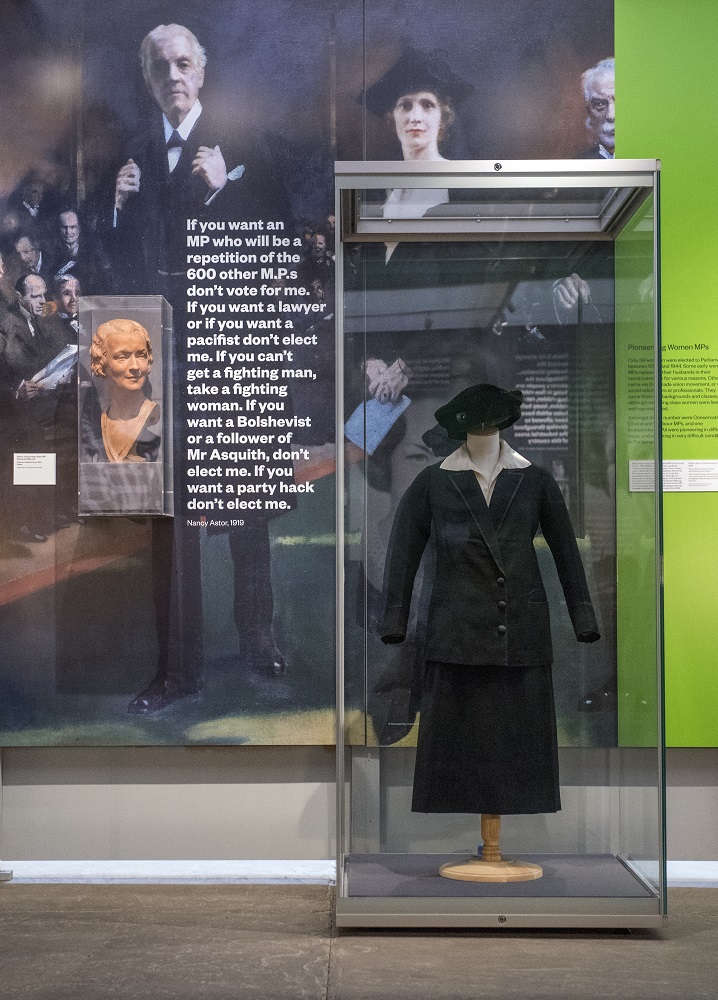
24 February 1920 – Astor gave her Maiden Speech
First speech by a woman in the House of Commons Chamber:
‘I shall not begin by craving the indulgence of the House. I am only too conscious of the indulgence and the courtesy of the House. I know that it was very difficult for some hon. Members to receive the first lady M.P. into the House. [HON. MEMBERS: “Not at all!”] It was almost as difficult for some of them as it was for the lady M.P. herself to come in. Hon. Members, however, should not be frightened of what Plymouth sends out into the world. After all, I suppose when Drake and Raleigh wanted to set out on their venturesome careers, some cautious person said, “Do not do it; it has never been tried before. You stay at home, my sons, cruising around in home waters.”’ Extract of Lady Astor’s Maiden Speech in the House of Commons, 24 February 1920
31 July 1923 – Intoxicating Liquor (Sale to Persons Under Eighteen) Bill passed
Nancy is responsible for the first Private Members Bill ever passed by a woman. The bill was often commonly referred to as ‘Lady Astor’s Bill’. It was named such to be used against her as an election tactic.
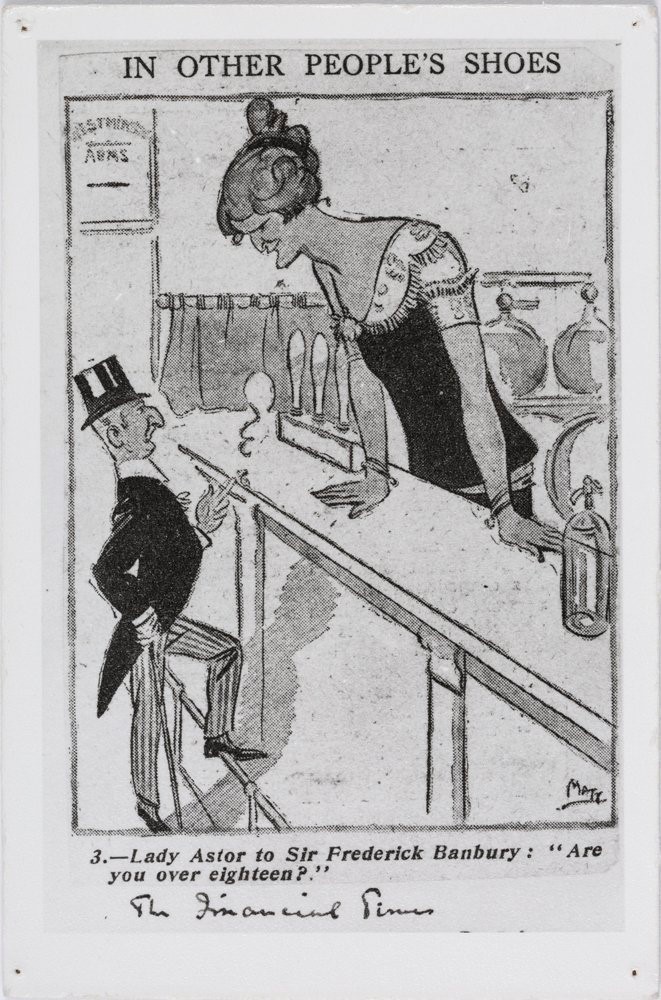
2 July 1928 – Equal Franchise Act
The Equal Franchise Act of 1928 granted equal voting rights at 21 to women and men. Astor had been passionately committed and highly vocal on promises made by the Conservative party to grant the equal franchise which she consistently pressed. She had also acted as a conduit for women’s groups in parliament, something they celebrated in a garden party at Cliveden.
1931 – Astor visited Russia and had an interview with Stalin
Nancy had a long term platonic friendship with George Bernard Shaw despite their very different politics. George Bernard Shaw, Nancy and Waldorf (her husband) made up a party who visited Russia. In an interview with Stalin, Nancy asked him, ‘When are you going to stop killing people?’ Stalin responded ‘When it is no longer necessary for the protection of the state’.
17 June 1936 onwards – The Cliveden Set and appeasement
Many of the Astor’s social circle were supporters of appeasement and were accused of influencing foreign policy. In 1936 the communist journalist Claude Cockburn published an article in his anti-fascist journal, The Week alleging the existence of a ‘Cliveden Set’, a group of influential people who used their wealth, connections and ownership of newspapers to subvert the policy of the government.
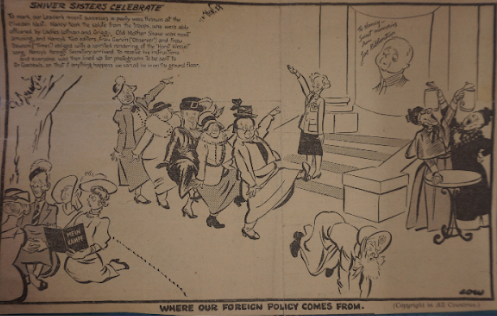
This was a claim which Nancy called a ‘terrible lie’ and considered herself a pacifist. However, her reputation was irretrievably damaged. In reality the Astors’ attitudes were little different than many of their class and social standing who saw fascism as a bulwark against communism. The term ‘Cliveden Set’ was first used by Reynolds News on 28th November, 1937. There is no evidence that Nancy was a fascist or a Nazi sympathiser.
Anti-Catholicism and Anti Semitism: Astor was anti-Catholic as there is plenty of archival evidence for this including her refusal to employ Roman Catholics as staff, though her position softened as she got older and there are many anecdotal stories of kindnesses towards Catholics she later employed. But evidence that she was strongly anti-Semitic is often circumstantial. As is common with Nancy, she often made statements off the cuff but they are markedly different to her responses to Jewish individuals who contacted her directly in the late 1930s asking for help and who she did help. Undoubtedly, by modern standards Nancy held some views that today are difficult to swallow, Stafford Cripps referred to her in Parliament as ‘The Member for Berlin’. She did feel that she was being made victim of ‘Jewish Communistic propaganda’ (for more information please see ‘FAQs’ and ‘Astor’s legacy’).
1939-1945 – World War II
Nancy Astor was MP for Plymouth Sutton, a naval constituency. Despite her initial support for appeasement by 1940 she believed her patriotic duty was to vote to install Churchill as Prime Minister. The Astors remained in the constituency during the Plymouth Blitz which razed much of the city, holding steadfast with their constituents and servicemen. She organised the evacuation of children, arranged and attended tea dances on the Hoe to boost morale. In March 1941, King George VI and Queen Elizabeth visited Plymouth . Only hours later, Plymouth suffered one of the worst air raids of the war. When Winston Churchill visited in May 1941 she told him “It’s no good crying Winston, you’ve got to do something!” Astor also supported a Red Cross hospital for Canadian soldiers at Cliveden. Moreover, by the end of the war, all four of her sons were on active service abroad (for information on the ‘D Day Dodgers’ legend please see ‘FAQs’ and ‘Astor’s legacy’).
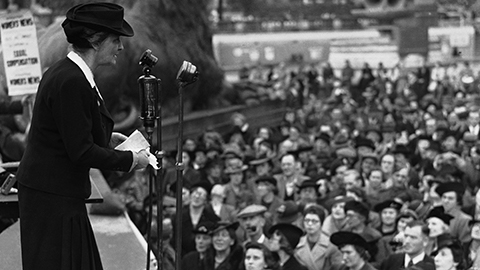
5 July 1945 – Nancy retired from Parliament
Nancy Astor won 7 elections between 1919 and 1945. She retired reluctantly, influenced by her family and an aging local party. Lucy Middleton (Labour) succeeded her (1945-1951) followed by her son Jakie.
17 July 1959 – Nancy given the Freedom of the City of Plymouth
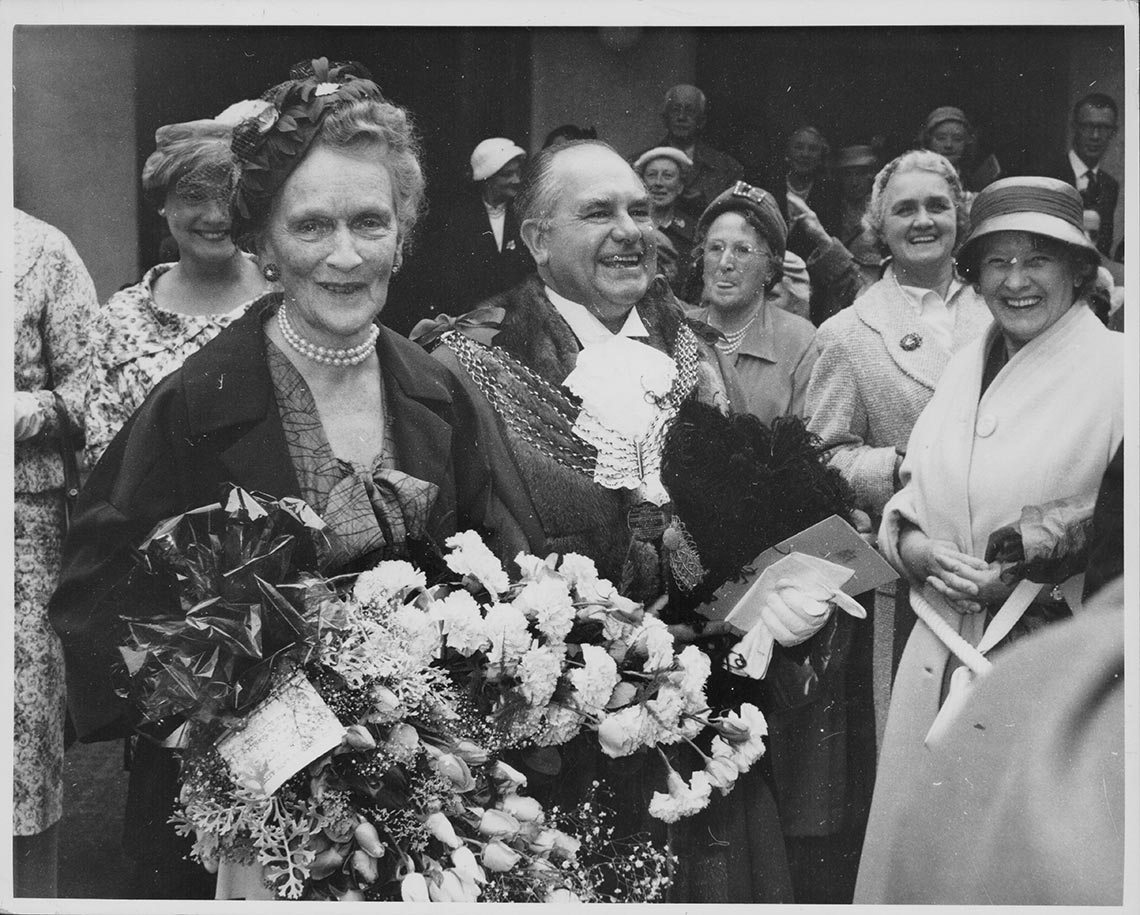
2 May 1964 – Nancy Astor died at Grimsthorpe Castle, Lincolnshire.
Seeing all her children by her bedside during her last illness, Nancy asked “Jakie, is it my birthday or am I dying?”

